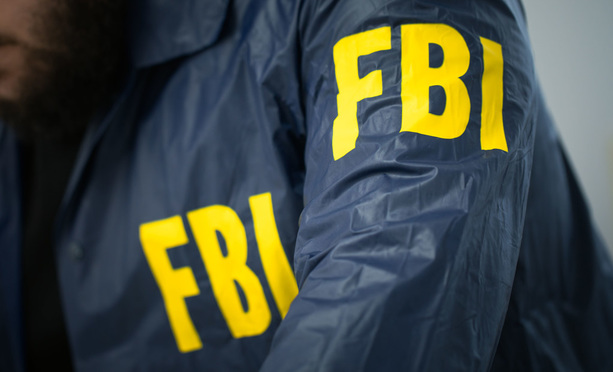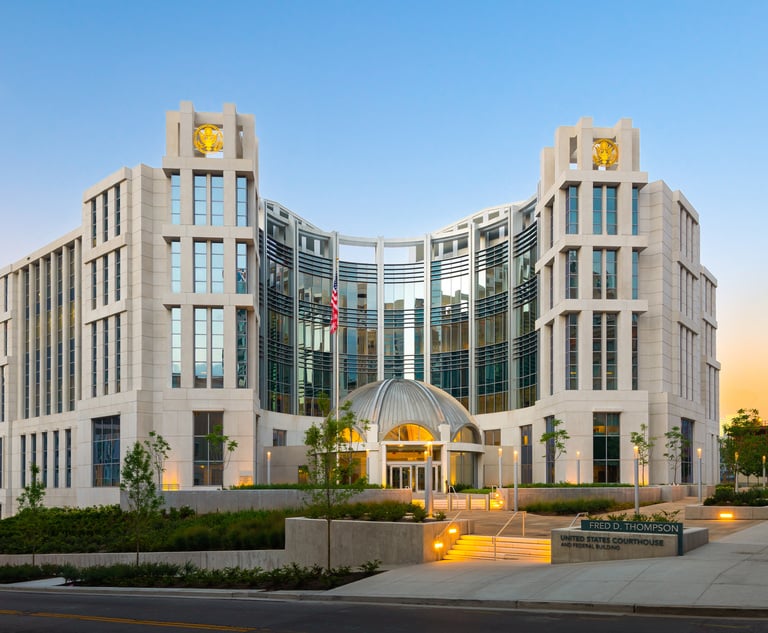Judges Skeptical of FBI Arguments in Suit Over Reporter Impersonation
A three-judge panel at the U.S. Court of Appeals for the D.C. Circuit questioned the FBI's representation of its search process in a hearing Monday.
November 13, 2017 at 02:03 PM
8 minute read

A federal appeals court panel in Washington, D.C., seemed skeptical of arguments by the government on Monday that the FBI has fully complied with an open records request about its practice of impersonating journalists in criminal investigations.
The Associated Press and Reporters Committee for Freedom of the Press argue in a lawsuit filed in 2015 that in searching for records responsive to their Freedom of Information Act (FOIA) request, the FBI ignored certain locations where the records could have been found.
In oral arguments Monday, Judges Brett Kavanaugh, David Tatel and Laurence Silberman of the U.S. Court of Appeals for the D.C. Circuit repeatedly pressed Justice Department lawyer Joseph Busa about why the FBI did not explain in greater detail how it conducted the searches.
Tatel said that D.C. Circuit case law shows that merely “passing along” a FOIA request to different components of the agency isn't enough to satisfy the FBI's burden under the law. The agency should, Tatel said, describe how a search was done.
Busa argued that in those cases, the requests were for specific records related to a certain case or had some other identifier. In this case, he said, the request was for “all records” pertaining to the FBI's practice, which he described as “nebulous.” But the judges were not satisfied.
“Why wouldn't you describe exactly how they did it?” Silberman asked Busa, referring to the FBI's responses about how it conducted the search.
The Associated Press and Reporters Committee asked the FBI for three categories of documents: those pertaining to a 2007 investigation in which the FBI was known to have impersonated an AP reporter, any records about agents impersonating news media since then, and any internal guidelines and other documents about the policy generally.
The FBI did not provide any documents until the groups sued in 2015. The groups also claimed the FBI grouped parts of the FOIA request together illogically, searching for some records in some systems while looking for different types of records in others.
The groups appealed to the D.C. Circuit this year after U.S. District Judge Richard Leon dismissed their lawsuit in February. Leon ruled that the FBI had conducted an adequate search, concluding the agency did not have to search every records system available.
Leon ruled the FBI only needed to search record systems that likely held the responsive records, which he believed they had done in good faith.
Monday, all three judges on the panel asked Busa about a declaration from the section chief of the FBI's Record/Information Dissemination Section, David Hardy, which explained that that different FBI offices were contacted and told to search for records in response to the requests. Busa said that because many individual employees were asked to form their own searches on their files and emails, any declaration explaining the search would be too long.
Silberman also said he was puzzled about why the FBI director's office wasn't searched, noting that as an official at the Justice Department in the 1970s, Silberman found the files of former FBI Director J. Edgar Hoover hiding in plain site in the director's office. Busa said the policy and training documents sought would not necessarily be in records in the director's office.
The judges also asked Reporters Committee lawyer Katie Townsend, who argued for the plaintiffs, which locations she thought should have been searched that were not. She listed the Inspector General's Office, which released a report on the FBI's practice of impersonating reporters in 2016, any offices that dealt with congressional inquiries about the issue, as well as other FBI field offices.
The FBI's practice of impersonating reporters came to light in 2014, when a different FOIA request revealed that in a 2007 investigation, an FBI agent impersonated an AP reporter to install malware on a juvenile suspect's computer. The juvenile was suspected of making bomb threats at Timberline High School near Seattle.
The revelation about the FBI's practice caused an uproar in the media, prompting then-FBI Director Jim Comey to write a letter to the editor in The New York Times defending the practice.

A federal appeals court panel in Washington, D.C., seemed skeptical of arguments by the government on Monday that the FBI has fully complied with an open records request about its practice of impersonating journalists in criminal investigations.
In oral arguments Monday, Judges Brett Kavanaugh, David Tatel and Laurence Silberman of the U.S. Court of Appeals for the D.C. Circuit repeatedly pressed Justice Department lawyer Joseph Busa about why the FBI did not explain in greater detail how it conducted the searches.
Tatel said that D.C. Circuit case law shows that merely “passing along” a FOIA request to different components of the agency isn't enough to satisfy the FBI's burden under the law. The agency should, Tatel said, describe how a search was done.
Busa argued that in those cases, the requests were for specific records related to a certain case or had some other identifier. In this case, he said, the request was for “all records” pertaining to the FBI's practice, which he described as “nebulous.” But the judges were not satisfied.
“Why wouldn't you describe exactly how they did it?” Silberman asked Busa, referring to the FBI's responses about how it conducted the search.
The FBI did not provide any documents until the groups sued in 2015. The groups also claimed the FBI grouped parts of the FOIA request together illogically, searching for some records in some systems while looking for different types of records in others.
The groups appealed to the D.C. Circuit this year after U.S. District Judge Richard Leon dismissed their lawsuit in February. Leon ruled that the FBI had conducted an adequate search, concluding the agency did not have to search every records system available.
Leon ruled the FBI only needed to search record systems that likely held the responsive records, which he believed they had done in good faith.
Monday, all three judges on the panel asked Busa about a declaration from the section chief of the FBI's Record/Information Dissemination Section,
Silberman also said he was puzzled about why the FBI director's office wasn't searched, noting that as an official at the Justice Department in the 1970s, Silberman found the files of former FBI Director J. Edgar Hoover hiding in plain site in the director's office. Busa said the policy and training documents sought would not necessarily be in records in the director's office.
The judges also asked Reporters Committee lawyer Katie Townsend, who argued for the plaintiffs, which locations she thought should have been searched that were not. She listed the Inspector General's Office, which released a report on the FBI's practice of impersonating reporters in 2016, any offices that dealt with congressional inquiries about the issue, as well as other FBI field offices.
The FBI's practice of impersonating reporters came to light in 2014, when a different FOIA request revealed that in a 2007 investigation, an FBI agent impersonated an AP reporter to install malware on a juvenile suspect's computer. The juvenile was suspected of making bomb threats at Timberline High School near Seattle.
The revelation about the FBI's practice caused an uproar in the media, prompting then-FBI Director Jim Comey to write a letter to the editor in The
This content has been archived. It is available through our partners, LexisNexis® and Bloomberg Law.
To view this content, please continue to their sites.
Not a Lexis Subscriber?
Subscribe Now
Not a Bloomberg Law Subscriber?
Subscribe Now
NOT FOR REPRINT
© 2025 ALM Global, LLC, All Rights Reserved. Request academic re-use from www.copyright.com. All other uses, submit a request to [email protected]. For more information visit Asset & Logo Licensing.
You Might Like
View All
Lavish 'Lies' Led to Investors Being Fleeced in Nine-Figure International Crypto Scam
3 minute read
SEC Puts Beat Down on Ex-Wrestling CEO Vince McMahon for Not Reporting Settlements
3 minute read
DOJ Files Antitrust Suit to Block Amex GBT's Acquisition of Competitor
Trending Stories
- 1'It's Not Going to Be Pretty': PayPal, Capital One Face Novel Class Actions Over 'Poaching' Commissions Owed Influencers
- 211th Circuit Rejects Trump's Emergency Request as DOJ Prepares to Release Special Counsel's Final Report
- 3Supreme Court Takes Up Challenge to ACA Task Force
- 4'Tragedy of Unspeakable Proportions:' Could Edison, DWP, Face Lawsuits Over LA Wildfires?
- 5Meta Pulls Plug on DEI Programs
Who Got The Work
Michael G. Bongiorno, Andrew Scott Dulberg and Elizabeth E. Driscoll from Wilmer Cutler Pickering Hale and Dorr have stepped in to represent Symbotic Inc., an A.I.-enabled technology platform that focuses on increasing supply chain efficiency, and other defendants in a pending shareholder derivative lawsuit. The case, filed Oct. 2 in Massachusetts District Court by the Brown Law Firm on behalf of Stephen Austen, accuses certain officers and directors of misleading investors in regard to Symbotic's potential for margin growth by failing to disclose that the company was not equipped to timely deploy its systems or manage expenses through project delays. The case, assigned to U.S. District Judge Nathaniel M. Gorton, is 1:24-cv-12522, Austen v. Cohen et al.
Who Got The Work
Edmund Polubinski and Marie Killmond of Davis Polk & Wardwell have entered appearances for data platform software development company MongoDB and other defendants in a pending shareholder derivative lawsuit. The action, filed Oct. 7 in New York Southern District Court by the Brown Law Firm, accuses the company's directors and/or officers of falsely expressing confidence in the company’s restructuring of its sales incentive plan and downplaying the severity of decreases in its upfront commitments. The case is 1:24-cv-07594, Roy v. Ittycheria et al.
Who Got The Work
Amy O. Bruchs and Kurt F. Ellison of Michael Best & Friedrich have entered appearances for Epic Systems Corp. in a pending employment discrimination lawsuit. The suit was filed Sept. 7 in Wisconsin Western District Court by Levine Eisberner LLC and Siri & Glimstad on behalf of a project manager who claims that he was wrongfully terminated after applying for a religious exemption to the defendant's COVID-19 vaccine mandate. The case, assigned to U.S. Magistrate Judge Anita Marie Boor, is 3:24-cv-00630, Secker, Nathan v. Epic Systems Corporation.
Who Got The Work
David X. Sullivan, Thomas J. Finn and Gregory A. Hall from McCarter & English have entered appearances for Sunrun Installation Services in a pending civil rights lawsuit. The complaint was filed Sept. 4 in Connecticut District Court by attorney Robert M. Berke on behalf of former employee George Edward Steins, who was arrested and charged with employing an unregistered home improvement salesperson. The complaint alleges that had Sunrun informed the Connecticut Department of Consumer Protection that the plaintiff's employment had ended in 2017 and that he no longer held Sunrun's home improvement contractor license, he would not have been hit with charges, which were dismissed in May 2024. The case, assigned to U.S. District Judge Jeffrey A. Meyer, is 3:24-cv-01423, Steins v. Sunrun, Inc. et al.
Who Got The Work
Greenberg Traurig shareholder Joshua L. Raskin has entered an appearance for boohoo.com UK Ltd. in a pending patent infringement lawsuit. The suit, filed Sept. 3 in Texas Eastern District Court by Rozier Hardt McDonough on behalf of Alto Dynamics, asserts five patents related to an online shopping platform. The case, assigned to U.S. District Judge Rodney Gilstrap, is 2:24-cv-00719, Alto Dynamics, LLC v. boohoo.com UK Limited.
Featured Firms
Law Offices of Gary Martin Hays & Associates, P.C.
(470) 294-1674
Law Offices of Mark E. Salomone
(857) 444-6468
Smith & Hassler
(713) 739-1250











